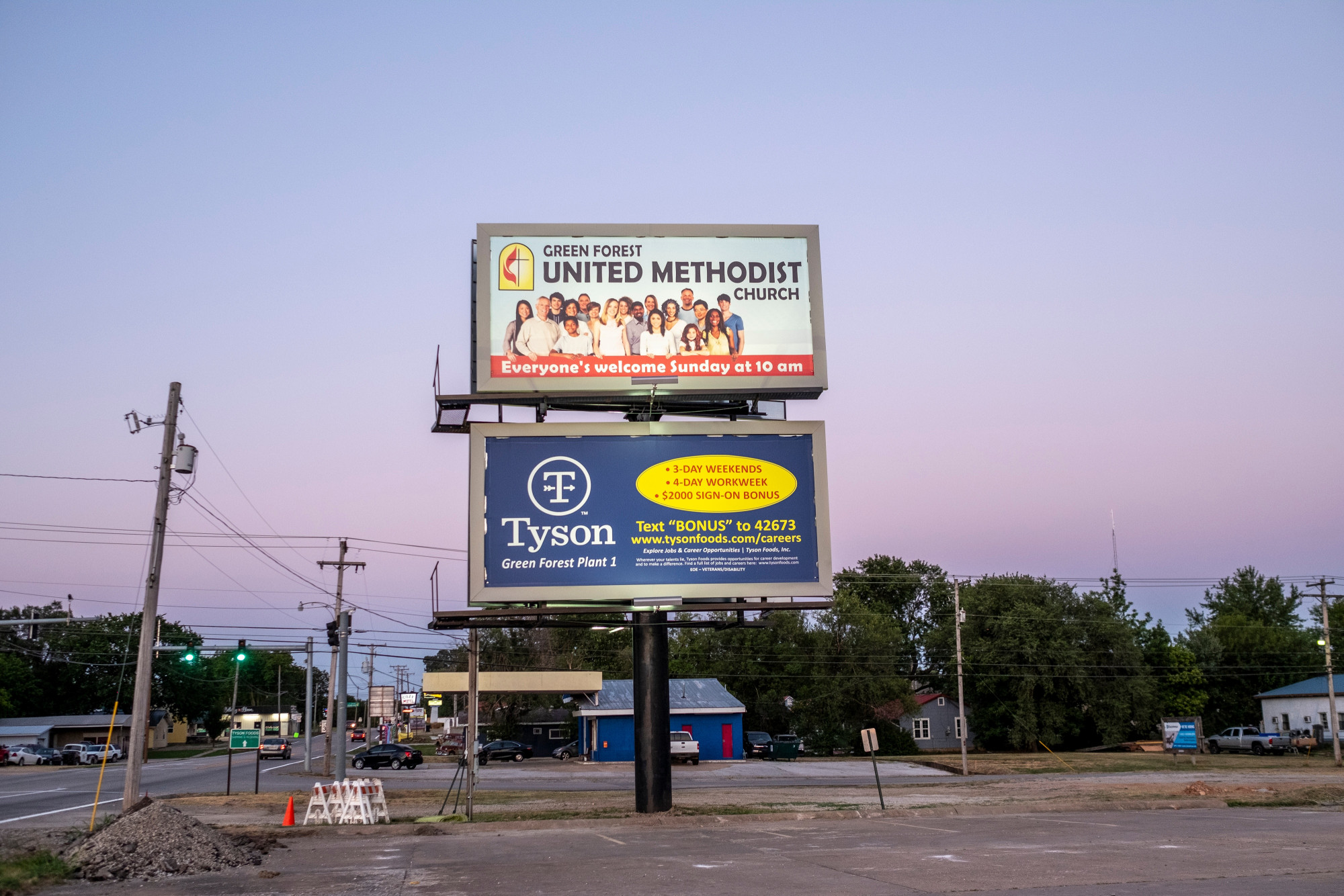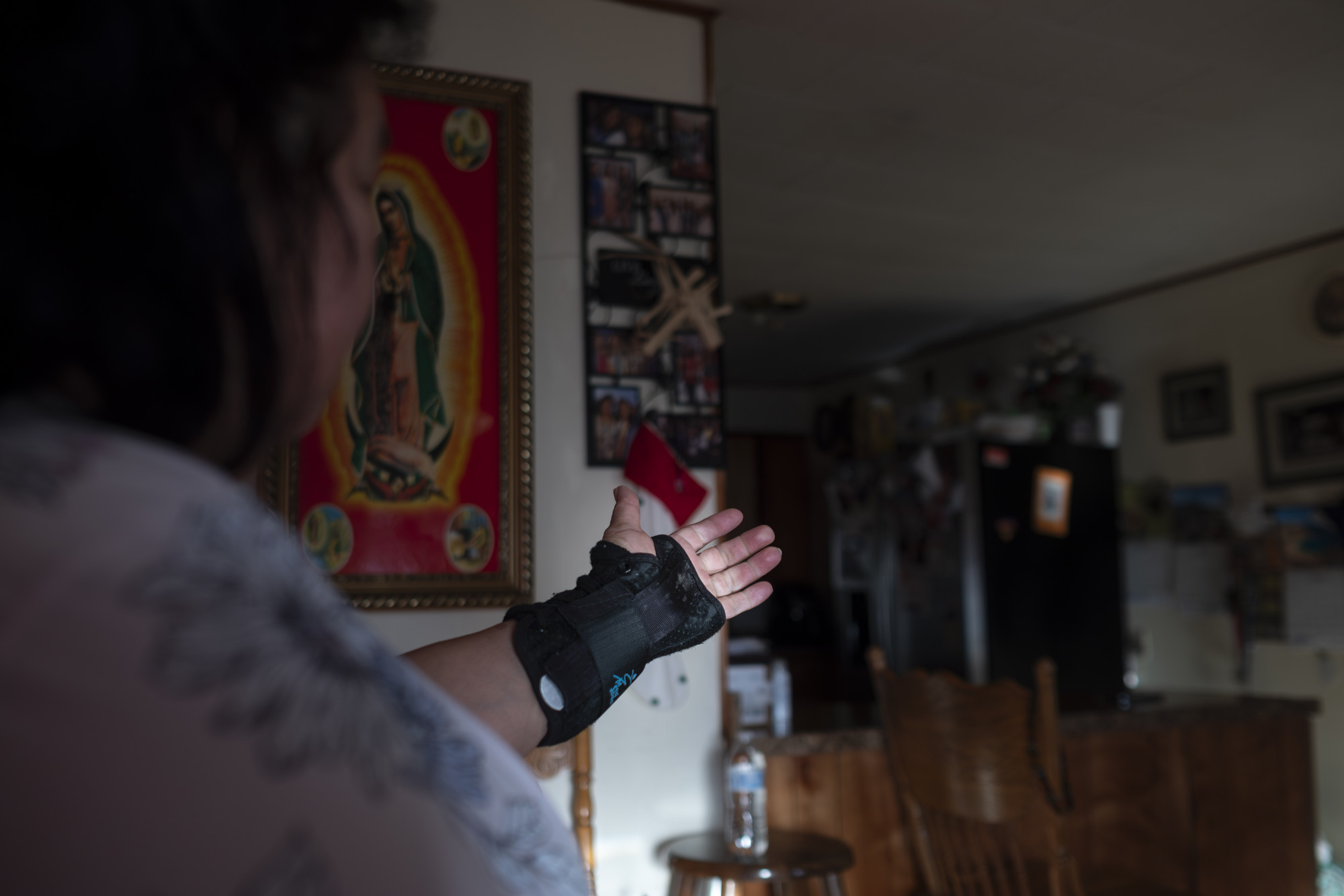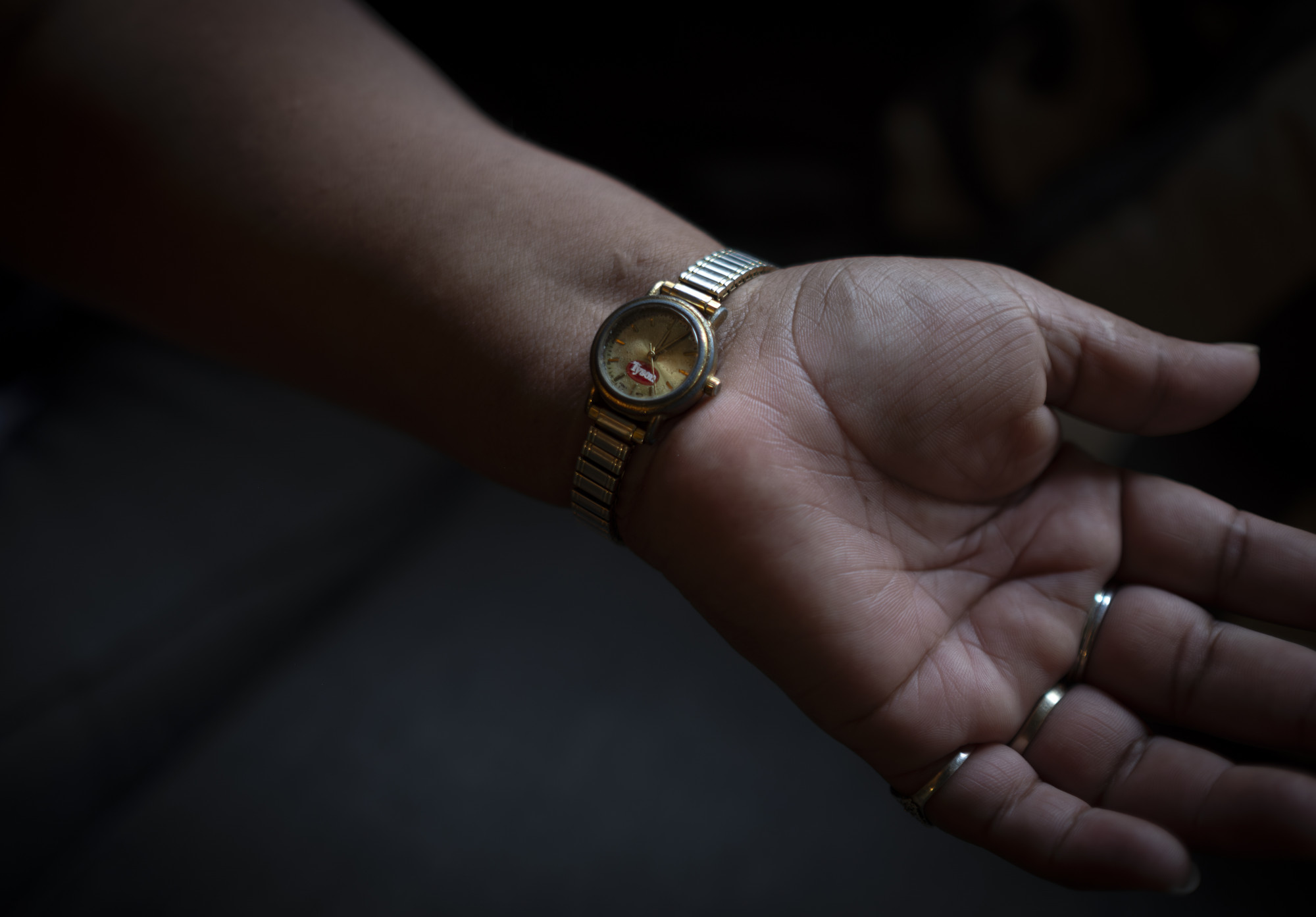Moral Beauty at an Arkansas Chicken Plant
An Excerpt from Life and Death of the American Worker
By Alice Driver

Jacky Muniello, courtesy of photographer
Tyson Foods is the largest meat producer in the United States and is headquartered in my home state.
I grew up in the 1980s in rural Arkansas—the center of the meatpacking industry in America. The Ozark Mountains are home to a constellation of economically depressed towns like Oark, where I was born. My neighbors grew their own food and tried to make ends meet working odd jobs. Some, like my parents, raised and butchered chickens at home. After my dad and uncle (who lived across the dirt road) chopped off the chickens’ heads, the birds would run around, their nerves briefly alive, as the last flows of life pulsed through their bodies. I close my eyes and see chickens running through the yard, their bloody heads left behind. Other people drove the forty-five miles to the chicken processing plant, where they worked and killed twelve thousand chickens per day, their hands in perpetual motion, completing a ritual both delicate and forceful—for one false movement could get them maimed or killed. In The Jungle, Upton Sinclair’s 1906 novel about the meatpacking industry, he wrote of meatpacking workers, “They were willing to work all the time; and when people did their best, ought they not to be able to keep alive?” Over a century later, the question remains relevant.
In Oark, people canned vegetables from their garden, hunted deer and ducks, and spent summers swimming in the mineral blue lakes and rivers that dot the landscape. Some neighbors had it worse than others. In the 1970s, Mexicans and Central Americans arrived in the Ozarks searching for agricultural jobs that didn’t pay much but allowed them to help their families back home—but only if the workers lived cheaply in Arkansas. When he first moved to Arkansas in the 1970s, Daniel Torres, an immigrant from Mexico, lived in an abandoned chicken house in the Ozark Mountains. By the time I was born in 1981, he had moved into a house built by my uncle Larry. With a big beard and a gentle way about him, Daniel became a part of my childhood, introducing me to my first Spanish words and Mexican hot chocolate. Whenever I biked up the hilly dirt road and crossed the Little Mulberry River, I would pass the chicken house where he had lived and imagine him huddled up in a corner, at the mercy of the elements, trying to sleep. As a child, I didn’t question why he lived in an abandoned chicken house or what a detail like that might say about Arkansas and beyond. Like many migrants in the 1970s, Daniel had come from Mexico to Arkansas looking for work. He arrived in a state of lack, hoping to save money to send home. He got his start living in the abandoned chicken house. But he liked the Ozarks, the skies dark with stars and the woods teeming with rattlesnakes and copperheads. So he stayed.
Chicken farmers, squeezed by companies looking to extract maximum profits, often went out of business. What had once been a way to make a good living became cutthroat as a handful of companies controlled the market. The Arkansas landscape is marked by the poultry industry, by its decaying buildings that hint at the exploitation upon which meatpacking is modeled. At Walmart, an Arkansas-based global power and one of the few grocery stores within an hour of where I grew up, I would see immigrants with scarred wrists, infected hands, and missing fingers. Some of them were disabled and rode around the store in motorized carts. Their labor was invisible, but I could see the marks of it on their bodies.

Jacky Muniello, courtesy of photographer
In researching this book, I spent four years, from 2020 to 2024, interviewing dozens of current and former meatpacking workers at Tyson Foods and their family members. I began to investigate the meatpacking industry because I grew up around meatpacking workers and knew their stories. When the pandemic hit in March of 2020, I applied for funding from the National Geographic Society to write an article about the impact of COVID on the meatpacking industry. Confronting a powerful company worth billions was daunting, and I never imagined that what began as one article would become a book. However, as meatpacking workers began to die of COVID, I continued to interview their families, hoping that people were ready to listen.
It was challenging to conduct interviews during the early months of the pandemic. I also realized that by conducting interviews via phone, it would be difficult to build the trust necessary for workers to feel safe speaking about labor conditions at one of the wealthiest companies in the world. In September 2020, I began driving across Arkansas from one poultry town to the next, speaking to workers at their homes. I conducted interviews outside, observing social distancing. In November 2020, after conducting interviews in Springdale, I tested positive for COVID. I spent a month in bed as meatpacking workers, many of whom had survived COVID, texted me with advice. Sick with COVID and unable to work or earn money, I moved in with my parents.This was one of many moments when I believed I would not finish this project or support the workers in their quest for justice.
The people I interviewed lived with the stress of fearing they could lose their jobs if the company discovered they had spoken to a journalist. Many agreed to be interviewed only if their testimony was anonymous. At their request, I have changed their names and obscured identifying details to help maintain their privacy. The workers who did agree to be interviewed “on the record” and identify themselves by their first and last names are either dead or no longer work at Tyson Foods. All those involved in this project generously allowed me to accompany them as they went about their daily lives, and they hope their stories make the meatpacking industry safer. They shared painful, poetic, and mundane memories, sometimes at a significant cost to themselves. The interviews were conducted in Spanish, Marshallese, Karen, and English, and were recorded and transcribed for accuracy. I am bilingual and conducted most interviews in Spanish and translated them into English. Language is central to my work, and translation is a literary act.

Jacky Muniello, courtesy of photographer
To get a fuller picture of what happened during those years, workers provided documentation related to a class action lawsuit against Tyson Foods. These documents included medical files, letters, and financial information. Members of the lawsuit shared personal papers, videos, photos, and documents.
While Tyson Foods refers to workers as “team members,” those interviewed did not want to be described with corporate language. In interviews, the workers wanted to discuss worker-led social movements and the power of a group of organized individuals to seek justice. I refer to them as they refer to themselves, as workers, organizers, and parents.
I am moved to do this work by what author C. E. Morgan describes as “moral beauty.” In a 2016 interview, she said: I think of moral beauty as what is the good and the just—terms perhaps best defined by their opposite: evil. Evil is the willingness to do damage to the other; its maximal expression is murder, but it includes a great deal of subtle and not-so-subtle injuries as it advances to that extreme. Evil acts reduce the other to an object, a being to its component parts, and obliterate subjectivity. Evil’s breeding ground is a lack of empathy. So I locate moral beauty in an otherregarding ethic. Or perhaps it’s better to say it’s not located anywhere, because it’s not a static entity. It’s love, and love is not a feeling but an action.
This book explores the moral beauty of the immigrants who process our nation’s meat and poultry, whose commitment to the good and the just is worthy of our attention.
Copyright © 2024 by Alice Driver. From the book THE LIFE AND DEATH OF THE AMERICAN WORKER by Alice Driver published by One Signal Publishers, an Imprint of Simon & Schuster, Inc, in stores now. Printed by permission.




